12 games that teach children programming
- Transfer
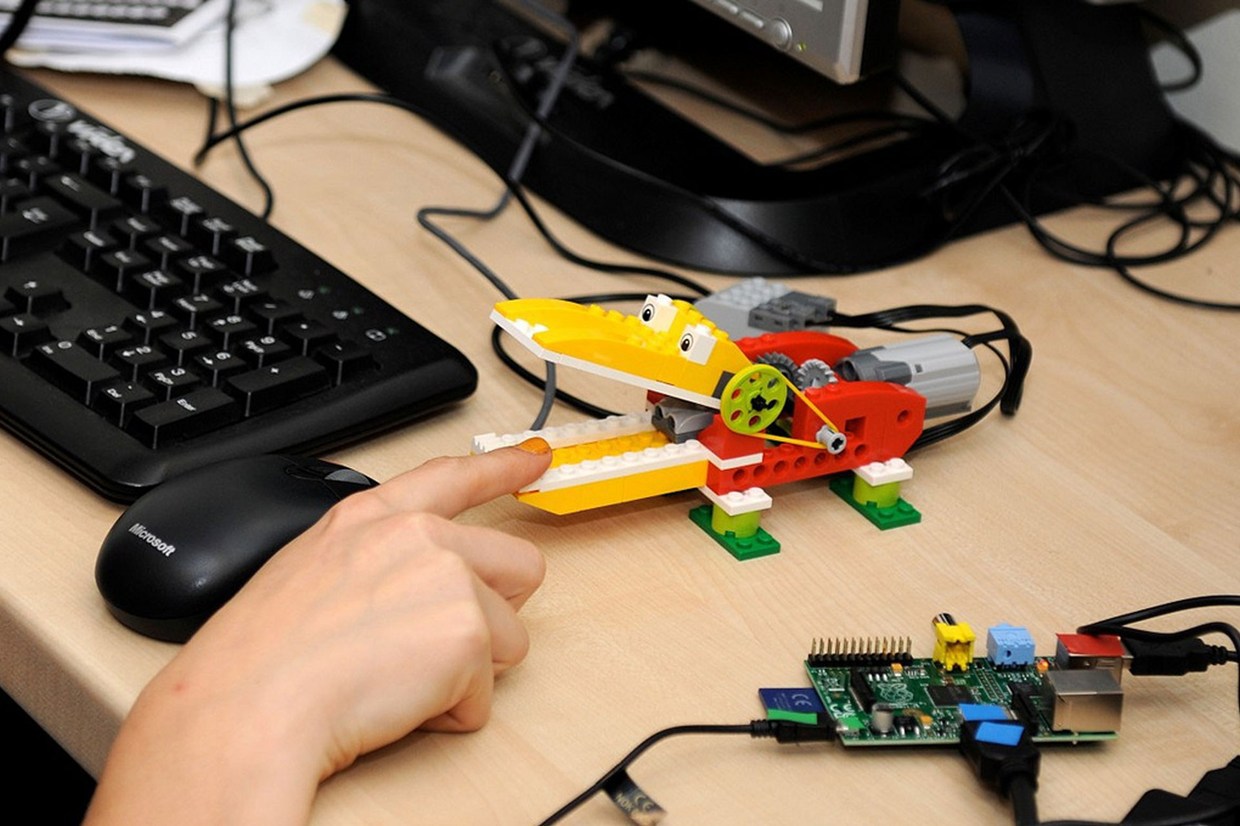
Programming is very popular now. Around the world, 36 million children take part in the activities of the "Programming Hour" movement. The purpose of these events is to help children become active rather than passive users of technology, as well as gain knowledge that in the future can help get a good job in our increasingly technical world.
Even if your children do not want to make a living in the future by programming, a basic understanding of the principles of programming develops thinking and, in the future, the child copes better with solving the arising problems. Bill Gates once said: “If you learn to create programs, it develops your mind, helps you think better and creates an image of perception of things. In general, I think that it will be useful to a person, regardless of the scope of his activity. ”
Platforms such as Scratch and Alice allow children (and adults) to create their own games and animations using simplified programming methods. However, not all children are interested. And for such children, there are many games that teach the basic principles of programming in a fun and accessible way.
We have selected several available options, including some games that are still under development, so you don’t have to look for them frantically. These games are available on different platforms - iOS, Android, PC, Mac, there are even board games - and many of them, and this is a huge plus, are distributed free of charge.
Lightbot and Lightbot Jr.
For whom: age 4-8 years (Lightbot Jr), 9+ (Lightbot)
Platform: Web browsers, iOS, Android
Price: Free (browser), $ 3 (iOS / Android)
More information: Browser game, iTunes, Google Play
Expert opinion: “With seeming simplicity, Lightbot highlights some interesting aspects of advanced programming” - Fritz Ruher, Associate Professor of Computer Science, University of Willamette, Oregon.
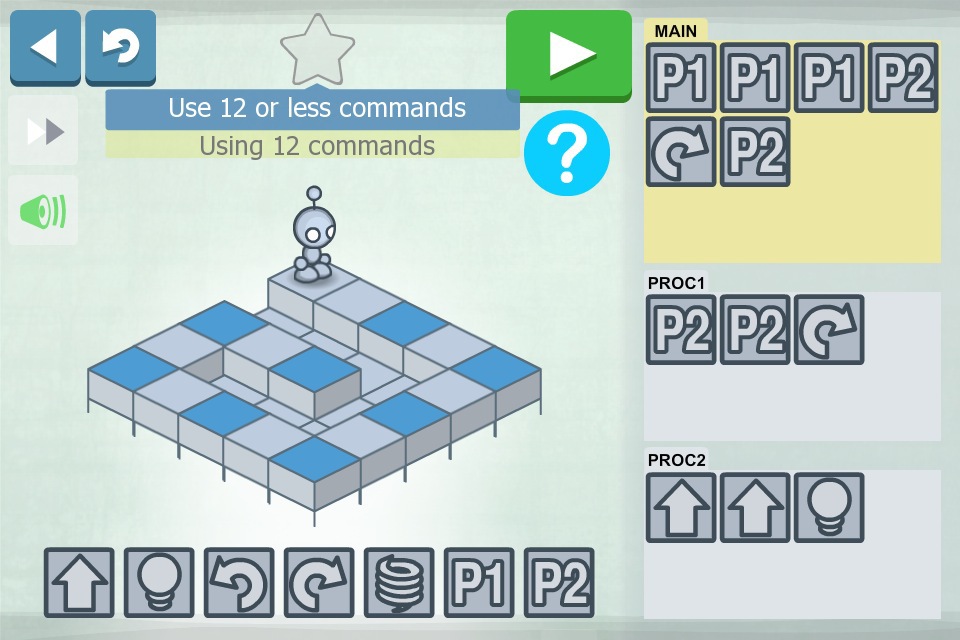
Signature: In many schools, Lightbot is used to teach the basics of programming. This game is used even in some universities.
Lightbot is a programming puzzle game created by Danny Yaroslavsky, a Canadian student. The goal of the game is to make the robot highlight all the blue tiles on the 3D grid. The difficulty is that this needs to be done in one approach, creating a series of commands for the robot.
Yaroslavsky says that Lightbot teaches planning, testing, debugging, procedures, and cycles. Your children will definitely enjoy playing with a cute robot, forcing it to highlight all the tiles in one approach.
You can play the free version of the game, which offers an hour of playing time. Moreover, you can play for free both on a computer and on your mobile device. And if this is not enough, then two full versions of Lightbot for different age groups are now sold in iTunes and Google Play.
Code Monkey Island
For whom: age 8+
Platform: board game
Price: $ 40 +
More information: Code Monkey Island website, Kickstarter
Expert opinion: “Code Monkey Island is an amazingly fun game that introduces children to programming” - teacher and activist technology development Phil Shapiro.

Signature: Code Monkey Island will not make magic wand programmers out of your children, but it will teach them the basics of programming.
Brooklyn resident Raj Sidhu wanted to explain to children the basics of programming in a fun way. He chose a completely non-technical solution to solve a high-tech problem and introduced the basics of binary logic and conditional commands into a family board game.
Playing Code Monkey Island is quite simple, and the game takes a little time - only about 45 minutes. Players use cards with instructions such as “Move each monkey three cages, NOT stepping on rocks” to move their monkey squads around the island.
Sidhu chose the format of the board game, because such games unite the family. “I wanted to create something that children, their parents, grandparents, can play. However, at the same time I wanted to help children through the game realize their learning abilities, ”he says on his Kickstarter page.
Code Monkey Island proved to be a successful Kickstarter project. In August, this game should already be distributed. You can reserve one copy of this game for yourself by transferring $ 40 or more to the project fund on Kickstarter.
Kodable
For whom: 5-8 years old
Platform: iOS
Price: Free ($ 7 - Pro version)
More information: Kodable game website, iTunes
Expert opinion: “Kodable game develops programming skills, as a result of which even young children can learn programming . To learn, they don’t even need to be able to read. ”- Terry Eikholz, K-5 Teacher for Gifted Children, Texas
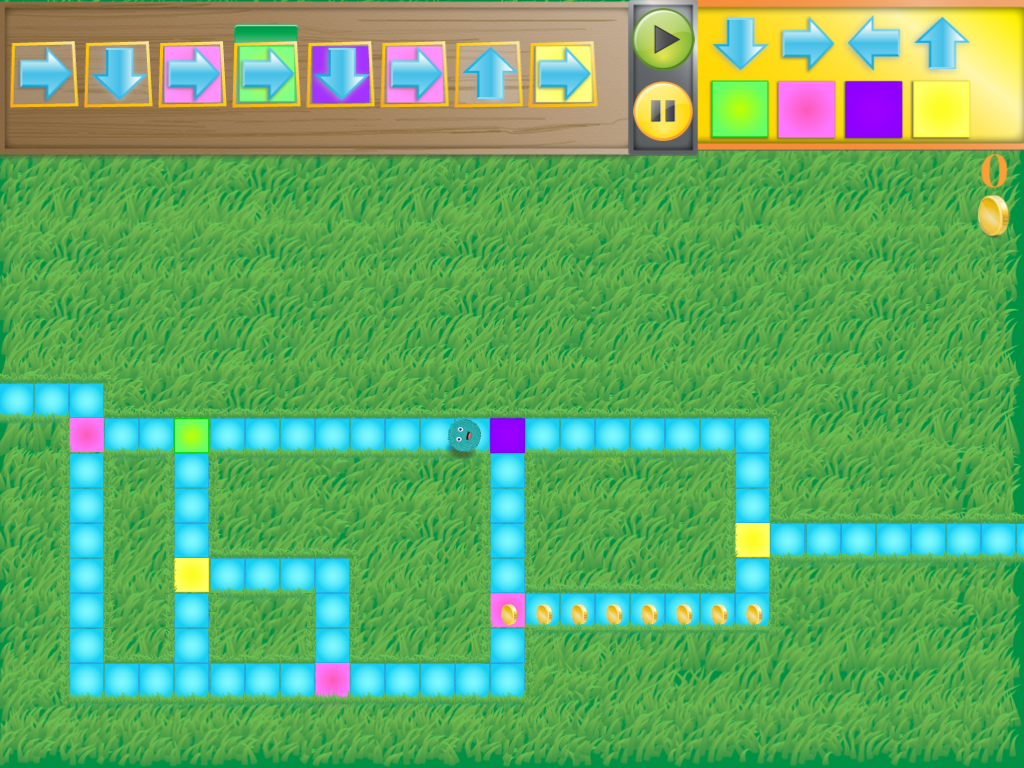
Signature: Co-founder Grechen Hübner reports that even two-year-olds can play Kodable.
Kodable is a maze game with 105 levels. This game helps teach children the basics of programming, such as conditions, loops, functions, and debugging.
The game does not use text at all, so even small children can play it. The heroes of the game are very bright, they look like funny aliens and are very popular with children.
“Adults are so afraid of programming, they find programming terrible and difficult,” says Kodable co-founder Grechen Hübner in an interview with TechRepublic. “It's funny that many adults underestimate the capabilities of their children. And the fact that we offer children the opportunity to solve different problems at such an early age proves how smart the children are. ”
The free version of Kodable has 45 levels. In the application itself, you can buy different levels and configurations. The Pro version, which costs $ 7, also has vocabulary extension tutorials and training instructions.
Robozzle
For whom: age 6+ (and adults)
Platform: web browser, iOS, Android, Windows phone
Price: Free (browser version), $ 0- $ 2 (mobile version)
More information: browser version of the game, iTunes, Google Play, Shop Windows applications
Expert opinion: “Robozzle is positioned as a social puzzle game, but I perceive it as a fun and interesting way to teach programming. And, perhaps, with the help of this game it will be possible to interest children in programming ”- Alfred Thompson, a computer science teacher at high school.
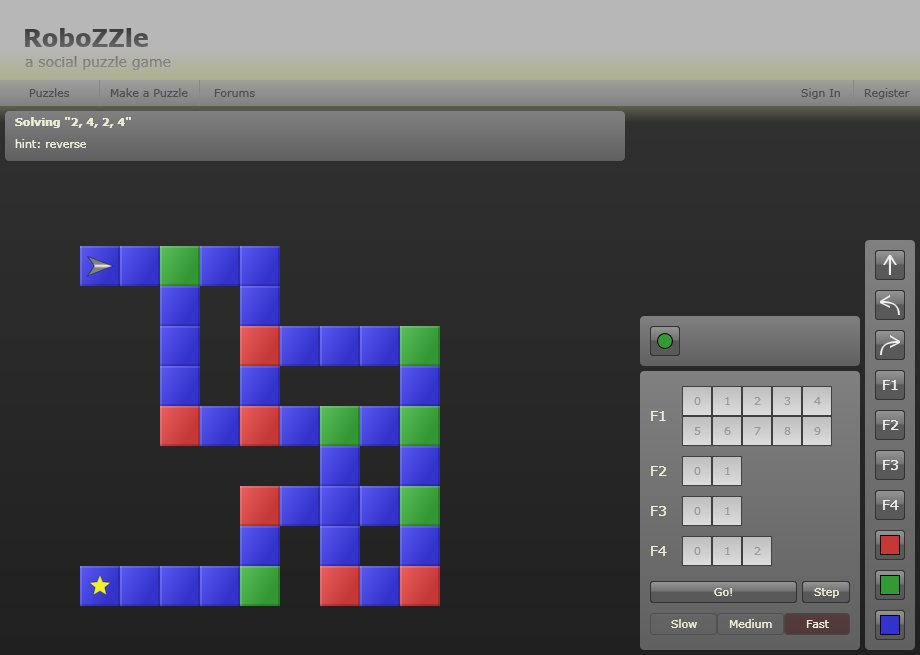
Signature: At first glance, the game Robozzle is very simple. But soon the player will be able to make sure that everything is not so simple.
If you are looking for something for older children (or for yourself), try playing Robozzle. This is a puzzle game that Igor Ostrovsky, a Microsoft programmer, created in his free time.
Robozzle's task is to guide the robot through the mazes using limited commands. The difficulty levels of the game vary: some levels are suitable for children, and some tasks will make even experienced programmers scratch their heads.
You can play the browser version of this game for free (using Silverlight), and players can also create, vote and comment on new levels.
Robozzle is available on iOS, Windows Phone 7, and Android. Prices vary.
Cargo bot
For whom: for children from 5 years old and adults
Platform: iOS
Price: Free
More information: iTunes
Expert opinion: “Great iPad app for learning programming. With his help, I taught my two children ”- Mike Lawrence, a teacher and co-founder of Google Teacher Academy.
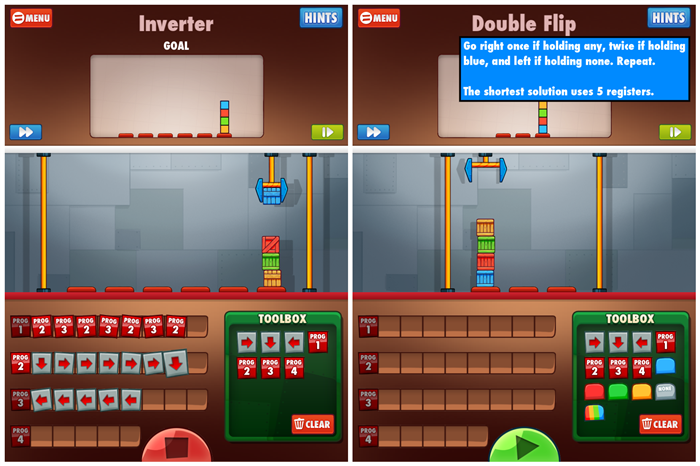
Signature: The Cargo-Bot game for iPad was created using the Codea
Cargo-Bot application - this is the first game written specifically for the iPad. Simple levels of this game are suitable for children from 5 years old, but really difficult levels begin further.
Players must move boxes around the factory using a moving crane. This uses programming concepts such as loops, procedures, and debugging.
“I wanted to create a game whose purpose is to move boxes around the factory. Forget you're really a programmer, ”said game developer Rui Viana in an interview with Fast Company.
Spacechem
For whom: for children from 10 years of age and adults
Platform: PC, Mac, Linux, iOS, Android
Price: Free demo, $ 7 (Steam), $ 3 (iOS / Android)
More information: the website of the game SpaceChem, Steam, iTunes, Google Play
Expert Opinion: “I think SpaceChem is the best existing programming learning game” - Neil Brown, Computer Education Researcher, University of Kent, UK.
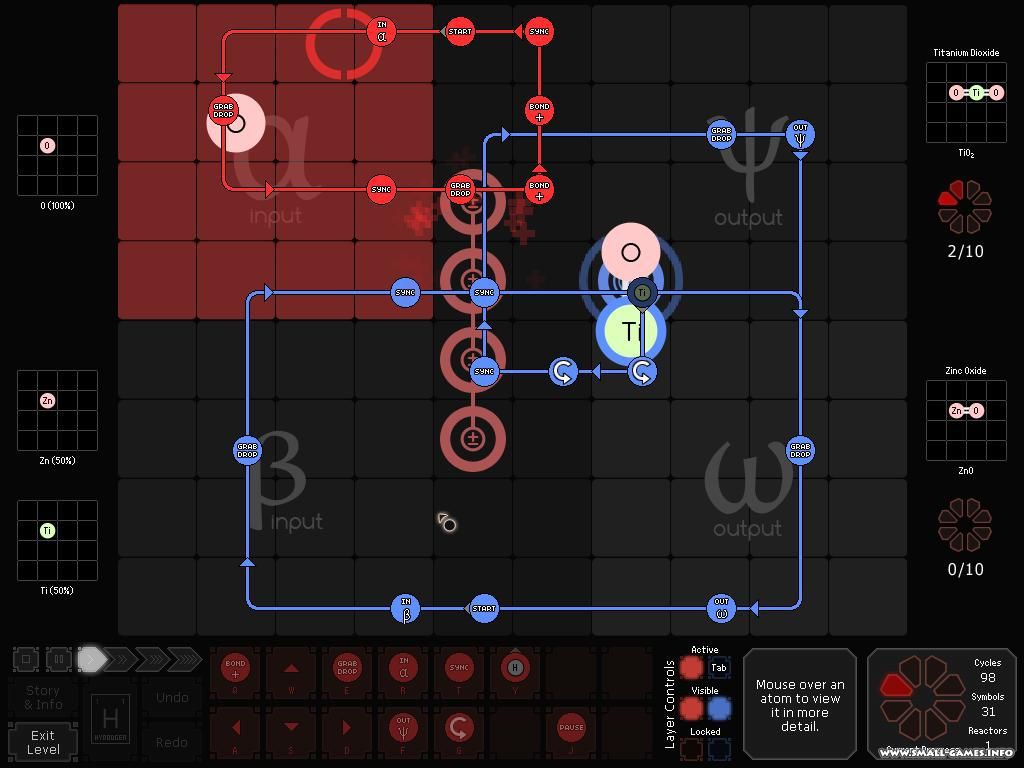
Signature: SpaceChem is used by many schools in the educational process, but at the same time it is a game.
SpaceChem is a combination of programming and pseudochemistry in science fiction. However, this game received excellent reviews after its release in 2011.
This game is quite complicated, so it will make you think both high school students and adults. SpaceChem's goal is to build a mechanism to fight monsters using programming concepts such as order execution, loops, transitions, and routines. The development company Zachtronics Industries explained what exactly is the value of this game.
“SpaceChem is a game that I would like to give myself at age 12 to go crazy solving puzzles,” says the Gaming to Learn educational blog. “When you hear people talking about the importance of learning to write code, they are talking about this game. Such games teach the player to think. ”
Robot turtles
For whom: 3-8 years
Platform: board game
Price: $ 25
More information: Robot Turtles, Kickstarter game website
Expert opinion: “Start learning as early as possible! This is amazing! The future now looks much more inspiring. ”- John Ledger, Chairman of the Board, T-Mobile
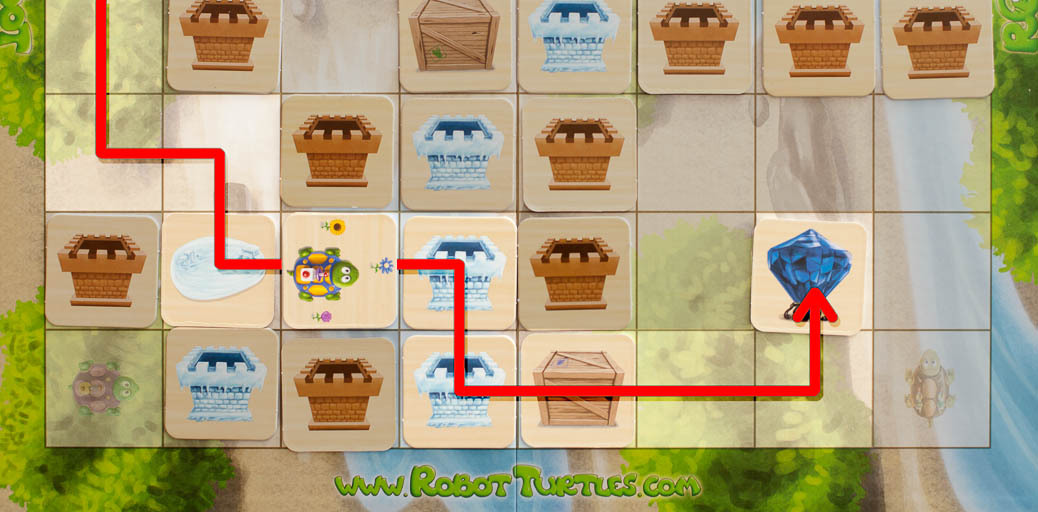
Signature: Playing Robot Turtles.
This board game that teaches children how to program last year raised $ 600,000 on Kickstarter. Despite the fact that at first funding of $ 25,000 was required.
The game was in demand. And this is not surprising, because Robot Turtles teaches the basics of programming through instruction cards, which controls the passage of turtles through the maze. The original 25,000 copies of the game were sold out in an instant. Children should use limited syntax, a sequence of commands, and debug when they make a mistake. The creator of the game, Dan Shapiro, says that understanding how to play appears in a few seconds.
“I really believe that programming is a superpower that you can offer your children. This is the way to ensure that they do not stay away from the innovations of the future, ”Shapiro said in an interview with TechCrunch.
The Robot Turtles game was recently acquired by ThinkFun, a game company and this month, has become available for the mass market.
Code combat
For whom: 13+ (or under supervision / coaching)
Platform: web browser
Price: Free
More information: Code Combat game website
Expert opinion: “A very creative and exciting way to learn programming through the game” - Jason Buttles, Deputy Dean for the Development of Technological Library Processes and Policies, University of Alabama

Signature: Code Combat is a fun mix of wizards, warriors, ogres, and programming.
Code Combat is the only game on our list in which players must use the code in its purest form (currently Javascript, experimental support for CoffeeScript, Python, Clojure and Lua). Do not let this fact knock you out of the saddle, as Code Combat is a great opportunity to learn with pleasure.
You can start with the single-player levels of this fantasy game, and then apply your acquired programming knowledge to other players.
Code Combat is supposed to remain a free game, since the main income of developers is an offer to companies of high-level players. Yes, indeed: playing this game, you can get a job.
Ludos (Puzzlets)
For whom: 4-12 years
Platform: PC, Mac, iOS
Price: $ 100
More information: Digital Dream Labs
Expert opinion: “What sets Cloudboard (Ludos panel interface) apart from other currently available products is not only a combination of the physical and digital world, but also the development of cooperation skills” - Terry Eikholz, program teacher K-5 for Gifted Children, Texas

Signature: Ludos uses tiles, so programming becomes tactile for children.
The game Ludos is due out in August this year. The goal of the game is to make programming a real hands-on experience for children. Ludos allows players to place team tiles directly on the grid, programming the actions of the characters in the game.
Cork the Volcano will be the first Ludos game with a strong emphasis on programming fundamentals such as scheduling, consistency, and debugging. In the future, other games will appear in the system, because this system is an open platform, and therefore everyone can create applications for it.
Codemancer
For whom: 9-14 years old
Platform: PC, Mac, iOS, Android
Price: $ 20
More information: website Important Little Games, Kickstarter
Expert opinion: “A game in the fantasy genre with the main character who teaches children (and adults) !) programming? I like everything about this game! ”- Lauren Scott, Web Developer and Junior Instructor, Dev Bootcamp
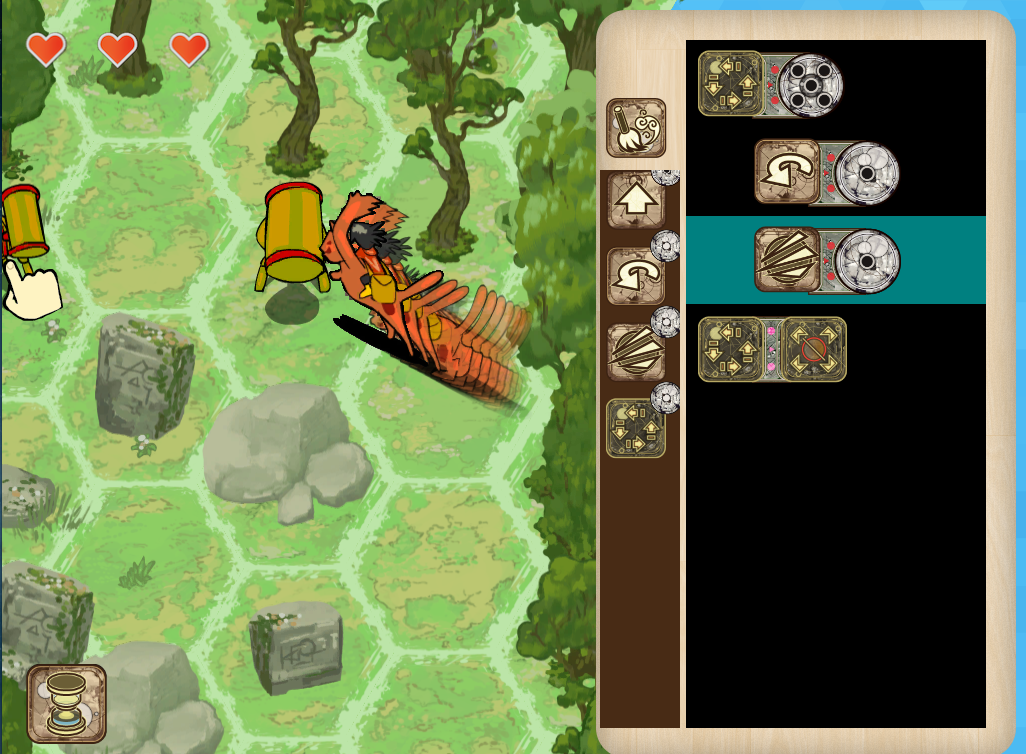
Signature: Codemancer raised 4 times more money on Kickstarter than originally stated.
Codemancer developers hope that after the release, which is scheduled for next summer, the game will help to stand out its interesting story and heroine.
After launching this successful Kickstarter project, players will use magic runes to control their actions, helping the heroine Aurora save her father's life. Creator Robert Lockhart hopes that accessibility will break down all barriers that prevent children from understanding programming.
“The Codemancer game language is very accessible,” Lockhart says on his Kickstarter page, “however it is also easy to translate into different programming languages. Programs become more complex when we introduce programming concepts such as variables, conditions, and functions. ”
Machineers
For whom: 8-14 years old
Platform: PC, Mac (iPad version is under development)
Price: Free demo
More information: Machineers game website
Expert opinion: “It seems that Machineers game will be the best example of an educational game” - Paul Hayes, Programmer and Game Developer
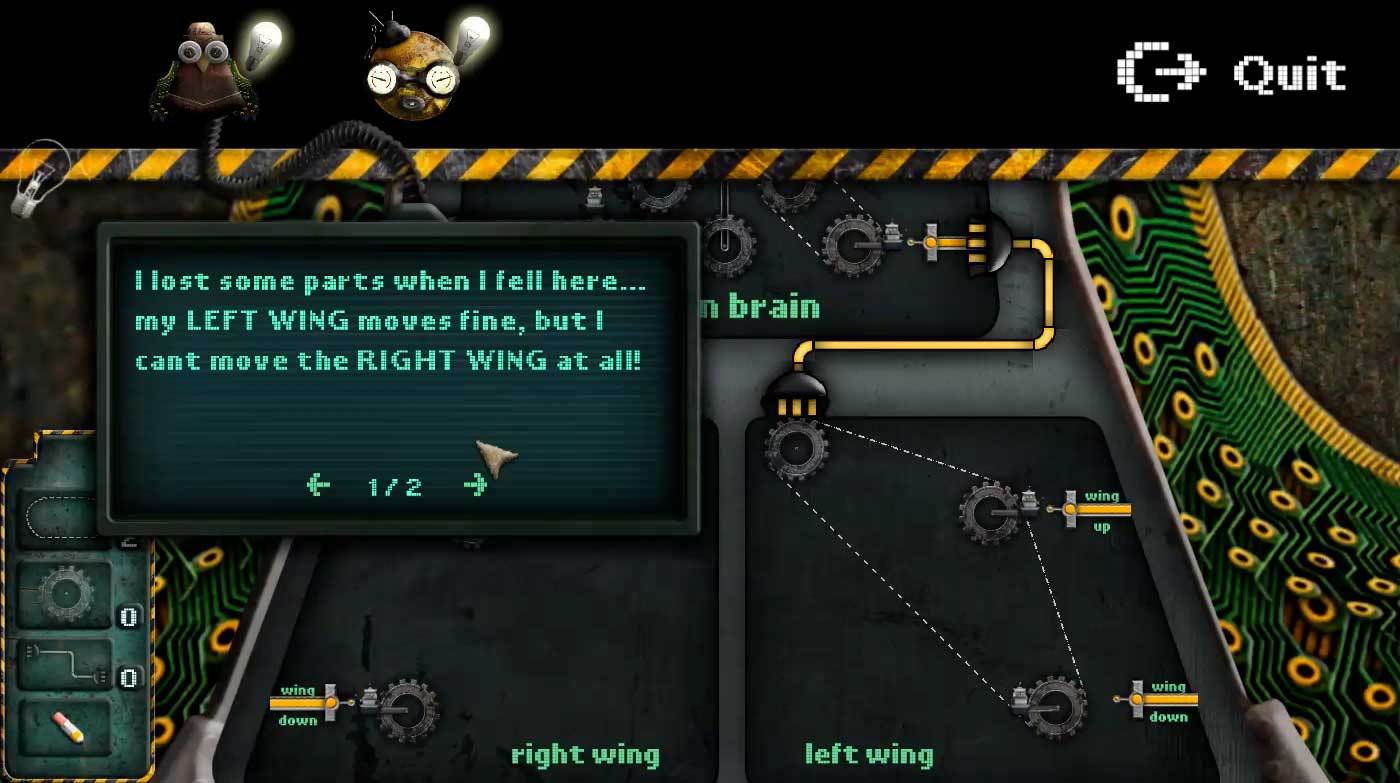
Signature: Machineers won the Best Educational Game nomination at the 2012 Serious Games Showcase and Challenge in Florida.
Machineers is an adventure-style game in which users deal with broken devices. Players must repair the devices using the programming principles and drag-and-drop interface.
Enrique Laude, a member of the Danish Lohika Games team of Machineers developers, decided to release this adventure puzzle after one child tester complained that all educational games looked like "chocolate broccoli."
“This game is a preparation for further training,” Lode said in an interview with Indie Statik. “The game lacks any math and code, so the children will not be able to learn how to program. However, the game develops logical thinking and what is called process literacy - the ability to read and write processes. ”
While the game is in development, the demo version of Machineers for PC and Mac can be downloaded for free. Lohika Games plans to launch a full-fledged game for the iPad.
Bee-bot
For whom: 4-7 years
Platform: iOS
Price: Free
More information: iTunes
Expert opinion: “Do not pay attention to the device itself, just try and make mistakes, put forward hypotheses, test, test and achieve success” - Dog Peterson, session teacher, School of Education, University of Windsor, Canada
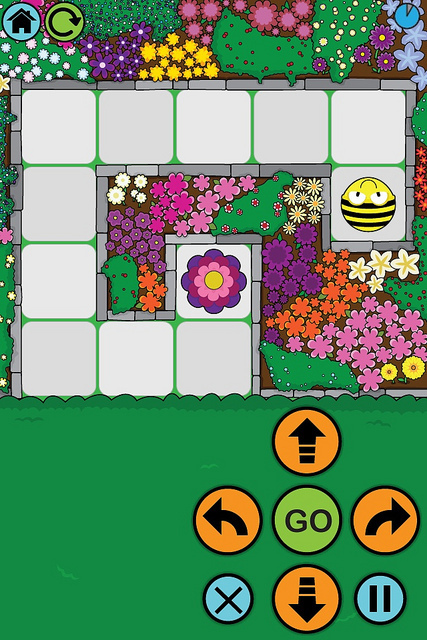
Signature: Many schools use Bee-Bot to teach programming fundamentals
. TSS, a learning game developer, created BeeBot to help children understand the object-oriented programming language and sequence. omand in programming. Simple and affordable application has 12 levels, limited in execution time, which are labyrinths with a constant increase in difficulty.
For children over 7 years old there is an additional application called BeeBot Pyramid. It is priced at $ 0.99.
